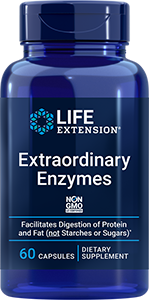
What are Digestive Enzymes? Supplement Guide
Published: June 2022
We tell toddlers to "make all gone" with their food, and it's always fun to see the look of wonder in their eyes as they magically make that grilled cheese sandwich—moments ago sitting perfectly intact on the highchair tray—"disappear."
The kiddos might be on to something: if you ever stop to think about how we transform our own meals from objects that take up every inch of a dinner plate into a pleasant memory (and, a few hours later, a reason to visit the restroom), making food "disappear" is indeed a wonderous act, if not a magical one.
We can thank our body's digestive enzymes for helping to break down sturdy cuts of meat, bowls of leafy greens, hearty nuts and seeds, crusty loaves of bread—and anything else that's on the menu—into nutrients we can use for energy. When we don't have enough of our own digestive enzymes, of course, boy, do they make their absence known—often with post-meal discomfort.
The good news is that often with the right digestive supplement, foods you thought were "off limits" may find their way back on your plate again, whether that's broccoli, beans or ice cream. Now that's magic!
So how do digestive enzymes work, and is a supplement right for you? Let's dive in!
What are digestive enzymes and how do they help with digestion?
So what is a digestive enzyme? Let's take a step back: an enzyme is a compound that facilitates a process or chemical reaction. As the name suggests, digestive enzymes are specific enzymes that help with digestion—and we produce them (or, more specifically, our salivary glands, pancreas, and microbes in our gut produce them) when we anticipate, smell, taste and consume food.
From thinking about what's for dinner and smelling that garlic cooking in the pan to taking your last bite, your digestive enzymes are hard at work.
Why do we need them? Well, we can't simply absorb fats, proteins, carbohydrates and other substances from our food without help from digestive enzymes.
Where do digestive enzymes come from?
Different parts of your digestive system produce different digestive enzymes:
Your mouth
. Starting with your first bite of food, digestive enzymes are at play (specifically amylase in this case) in your saliva. Ever do the experiment where you combine a bit of spit with water and a saltine cracker? Well, if you did (spoiler alert: stop reading now and try it first!) you were able to see digestion at play as your saliva helped break down the cracker.Your pancreas
. Spit test aside, the majority of digestive enzymes are actually found in the digestive juices created by the pancreas. (And that's certainly not all the pancreas does during digestion; the pancreas also creates hormones that regulate your appetite, among other roles.)Small intestine
. Certain healthy bacteria found in the small intestine's lining (such as lactobacillus) also produce enzymes that help us digest food. The lining of your small intestine is also where other enzymes from your pancreas are activated.
You also find enzymes in certain foods, and they serve purposes for us that may go beyond gut health. One great example is myrosinase, released when we chew raw cruciferous vegetables, which enables us to access their cellular health-promoting benefits. (If you're not a fan of broccoli, Brussels sprouts or other foods containing this enzyme, you can take a cruciferous vegetable supplement.) Another example of an enzyme-rich food is pineapple, the stem of which is a great source of bromelain, a protease that is famous for supporting joint health.
10 most common digestive enzymes: Roles & functions
Do you have an adventurous palate—natto for Tuesday's lunch, ratatouille for Thursday's dinner—or are you more of a meat-and-potatoes kind of eater? Even if you tend to stick with the most basic vittles, from a nutritional standpoint, all humans eat a variety of different types of food, and in response, our bodies produce a wide array of digestive enzymes to break up the various substances the digestive tract encounters.
The three primary components of our food are fat, protein, and carbohydrates—which require the body to produce three core enzymes:
Amylase
: Amylase is a digestive enzyme that breaks down carbohydrates. Interesting fact: amylase starts working in your mouth from your very first bite!Protease
: Produced in the pancreas, protease breaks down protein into amino acids and peptides (which are smaller groups of amino acids) that your body can then use for a variety of functions.Lipase
: As its name suggests, lipase breaks down fat (lipids) from your diet.
While amylase, protease and lipase are the core enzymes, we're just scratching the surface when it comes all of the enzymes that your body needs for digestion. Let's continue counting down other key digestive enzymes, many of which you might run across on the label of a digestive enzyme supplement (which typically will combine multiple enzymes, rather than just containing one):
Alpha-galactosidase
: Ever experience occasional gas after eating foods like black beans? Alpha-galactosidase (the main ingredient in your grandmother's Beano®) is an enzyme that helps make this healthful legume a bit less...musical.Cellulase
: If you ever experience difficulty digesting after eating a ton of veggies, you might want to supplement with cellulase, which makes it easier to digest the cell walls of plants.Hemicellulase
: Works similarly to cellulase to help you digest vegetables and fruits.Phytase
: Another popular enzyme to help you digest plant-based foods.Pectinase
: Also helps you eat your veggies…with more ease!Xylanase
: Yet one more digestive enzyme to take if you need help digesting high-fiber foods.Lactase
: One of the most well-known digestive enzyme supplements, lactase is what allows us to digest lactose, a sugar found in milk and other dairy products that often can give people digestive discomfort or occasional gas.
There are even additional enzymes beyond this list—pepsin is one you'll find within the stomach, and sucrase, which supports the digestion of sugar, to name a few—but these 10 are the ones you're most likely to find in an enzyme supplement.
How Digestive Enzymes Get Their Names
The ending of the majority of enzyme names is "-ase", and the first part of the word is related to the food substance it digests. That's why the enzyme that helps you digest protein is called "protease," while lactose, the sugar found in dairy products, requires the enzyme lactase for proper digestion. And you'll probably recognize the "lip" prefix in "lipase" from "lipid," a word for fat.
Now, when you see a word that has this form, you can start to understand what role it may play in the body!
Explore Our Best Digestive Health Supplements
What does a digestive enzyme supplement do?
Digestive enzymes help your digestive system break down specific compounds in everything you eat so that you can use the food for nourishment and also comfortably digest it. When you don't produce an optimal amount of a specific enzyme, a supplement can pick up the slack!
As an example, let's look at lactose, which is formed by two simple sugars, glucose and galactose, which are joined by a bond. The digestive enzyme lactase breaks that bond so your body it can use these two simple sugars for energy. But not everyone produces an optimal amount of lactase—and those people likely know who they are, since they likely produce occasional gas and have other discomforts after enjoying that yummy bowl of ice cream.
6 reasons why you might need a digestive enzyme supplement
How can you tell whether you need a digestive enzyme supplement? To get technical, from a medical perspective, only people with specific health needs who have an enzyme deficiency need to supplement—but that doesn't mean many of us won't benefit greatly from taking an enzyme supplement.
Here are six common reasons why a supplement might make sense for you:
Certain foods don't agree with you
. The next time you're experiencing occasional gas or another type of digestive discomfort, think about what you ate. Was it beans? A very high protein meal or high-fat? You just might be surprised by how much better you feel the next time you eat these kinds of foods if you wash them down with a digestive enzyme supplement!You get bloated after you eat
. If you commonly think to yourself, "I should have worn yoga pants" after you have a big dinner, instead of making a wardrobe change, consider taking a supplement for bloating immediately before or with your meals.You're on a new healthy eating kick
. Did you previously subsist on simple carbs like pasta and potato chips, but now you've got a new weight loss goal (or are just trying to get in more wholesome foods) so you've turned over a new leaf...which involves eating a lot of leaves? It's not unusual to run into some digestive difficulties as you venture into healthier eating. An enzyme supplement can help you enjoy your new healthy diet—and the weight loss that comes from your efforts!You're switching to a mostly plant-based lifestyle. Similarly, if you've been a carnivore and are thinking about going green, switching from animal-based or animal-sourced foods to a plant-based diet can take some getting used to! Digestive enzymes can help make your new menu easier to digest. (Pro tip: if you're going meatless, also check out this list of supplements vegetarians should be taking.)
You've got a "nervous stomach"
. You're not imagining it: that growing to-do list—or your less-than-harmonious relationship with that nosy neighbor—is the reason your stomach is in knots! Aside from finding a healthy way to manage stress so that you can restore balance to the gut-brain axis, taking an enzyme can be helpful when you're dealing with hectic, challenging times.You've been under the weather lately
. Not feeling like you're at 100%? Various things can disrupt normal, healthy gut function, and when that happens, it will take time for your body to slowly repopulates the healthy flora. A probiotic may help you get back on track more quickly, and a digestive enzyme supplement can help you shrug off any lingering gastric discomfort.
Pro tip: Not sure what digestive health supplement is right for you? Take our Health Needs Quiz for instant recommendations.
Can I get enough digestive enzymes from food?
No, you cannot get the digestive enzymes you need from diet alone to support your digestive health. (If your food actually contained all the enzymes needed to digest it, it would do just what happened in the cracker experiment and end up as a pile of mush! Definitely not making the specials list at a five-star Michelin restaurant!)
What is the best time of day to take digestive enzymes?
Digestive enzymes are intended to do just that: help you digest food. So, they should be taken immediately before or with meals. Forget to take an enzyme and having post-meal discomfort? No worries: you can take your digestive supplement after you eat instead and still may experience the benefits. Pro tip: Take your other fat-soluble vitamins at the same time, since they also are absorbed best when taken with food!
Digestive enzymes supplements: Dosage, side effects & risks
Some people with sensitive stomachs may experience side effects such as minor discomfort if they take a digestive enzyme supplement on an empty stomach or when they haven't eaten recently. To avoid side effects, always follow the instructions and dosage on the package or bottle—which is something you should do when taking any supplement. If you're not sure if you should take an enzyme supplement, talk to your health care provider.
Pro tip: We recommend looking for a digestive enzyme supplement that is a capsule or enteric-coated tablet rather than choosing a chewable formula.
Are there supplements you shouldn't take with a digestive enzyme?
You can take a digestive enzyme with other supplements—the most important thing is to take it with food.
Can I take probiotics and digestive enzymes together?
You certainly can! In fact, these are two digestive health supplements many people prefer to take together—we recommend taking a single formula that includes both digestive enzymes and probiotics. You can also take digestive enzymes with your prebiotic supplement.
Whether it's a prebiotic, probiotic, digestive enzyme, or all of the above, making sure you're taking the right digestive health supplements is the best way to ensure that you're getting the most nourishment from your food—so you can feel your best, before, during and after a meal.
Bon appetit!
References
- El Kaoutari, Abdessamad et al. "The abundance and variety of carbohydrate-active enzymes in the human gut microbiota." Nature Reviews Microbiology, June 2013, https://www.nature.com/articles/nrmicro3050
- Forsgård, Richard A. "Lactose digestion in humans: intestinal lactase appears to be constitutive whereas the colonic microbiome is adaptable." The American Journal of Clinical Nutrition, August 2019, https://academic.oup.com/ajcn/article/110/2/273/5512720?login=true
- Koppel, Nitzan et al. "Exploring and Understanding the Biochemical Diversity of the Human Microbiota." Cell Chemical Biology, January 2016, https://www.sciencedirect.com/science/article/pii/S2451945615004778
- Ludikhuyze, L et al. "The activity of myrosinase from broccoli (Brassica oleracea L. cv. Italica): influence of intrinsic and extrinsic factors." J Food Prot., March 2000, https://pubmed.ncbi.nlm.nih.gov/10716572/
- Phillips, Elisabeth, PhD et al. "Digestive Enzymes." January 2017, https://www.clinicaleducation.org/news/digestive-enzymes/
- Tang, Jeffrey C F, MD et al. "How does a normal pancreas function?" Medscape, July 2019, https://www.medscape.com/answers/181364-14271/how-does-a-normal-pancreas-function
- "Amylase and a simple experiment." Practical Biology, March 2011, http://practicalbio.blogspot.com/2011/03/amylase-and-simple-enzyme-experiment.html
- "How does the gallbladder work? Institute for Quality and Efficiency in Health Care, 2006, https://www.ncbi.nlm.nih.gov/books/NBK279386/
- "The Digestive Process: What Is the Role of Your Pancreas in Digestion?" https://www.hopkinsmedicine.org/health/conditions-and-diseases/the-digestive-process-what-is-the-role-of-your-pancreas-in-digestion
Always be in the know!
Access the latest deals, wellness news, expert health tips & more!









